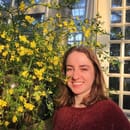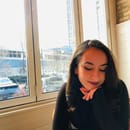“Fake news” is a term that has dominated the internet since the 2016 presidential election but it’s not a new one, argued Loyola University Chicago history professor, Michelle Dickerson, in her speech “History of Fake News in the United States” on Wednesday, Oct. 23.
Dickerson’s speech was part of the Loyola Libraries’ faculty speaker series and was held on the fourth floor of Loyola’s Information Commons. An estimated 140 people were registered for the event and even more were in attendance, according to Loyola Libraries’ community relations and communications coordinator Jocelyn Cheng.
“I’m a historian, not a journalist,” Dickerson disclaimed to open the event, despite her experience as an opinion writer for “The Washington Post.” Dickerson began by explaining the rivalry between two early American newspapers, the “Gazette of the United States” and the “National Gazette.” These papers were deeply rooted in politics, each claiming and supporting a specific party.
“It is through the newspapers that people began to identify as American,” Dickerson explained. Readers also identified with a certain party by choosing to read that party’s paper. When the funding of newspapers switched from wealthy investors to corporate advertisers, news became a mass media beyond politics.
“Readership of the news become more democratic,” Dickerson pointed out. Because of this, papers began to rely on spectacle to grab readers’ attention, which is how the first occurrences of fake news emerged, she explained.
Dickerson then took her audience through the various stages of American journalism, from the period of muckraking, “when journalists increasingly write as social reformers,” to the explosion of ethnic and racial presses in the 20th century.
According to Dickerson, the first explicit mention of “fake news” occurred during the infamous period of yellow journalism, specifically the buzz around the Spanish-American war, culminating in the false report of the sinking of the U.S.S. Maine.
“Publishers did everything they could to exploit the moment,” Dickerson commented. “They actually made up news whole-cloth, using fake sources, giving false names, false states, false locations of skirmishes… The U.S. used the incident as the reason for entering the war.”
“Truth in news remained a valued commodity and, in fact, prompted the rise of national newspapers like ‘The New York Times,’” Dickerson explained.
Despite earlier journalists’ best attempts at establishing a code of ethics, similar occurrences happened over a century later with the Sept. 11 terrorist attacks, Dickerson pointed out.
“The Bush administration had to convince a reluctant nation to get behind him,” she claimed. They did this by falsely reporting the existence of weapons of mass destruction; thus the news “did not quite start the war [on terror], but they certainly enabled the war.”
“[Fake news] has become vigorous, once again, arguably more than ever,” Dickerson ended with, barely touching on the current political climate. Still, she’s not wrong.
Fake news sources have played a critical role in recent politics; not in catalyzing wars, but in shaping the outcome of elections — specifically the 2016 presidential election. Trump has often criticized reliable news sources like CNN and “The New York Times” as being “fake news” simply because he doesn’t agree with their claims, when ironically it was actual fake news that helped him earn the presidency. Media analysts and “anti-Trumpers” alike are quick to credit Russia for the creation of fake bots that spammed social media with pro-Trump, anti-Hillary messages, campaigns and idelogies.
While this is far from false, many reports overlook the prominent role played by mere teenagers in the small nation of Macedonia, located in southeastern Europe. Wired, a magazine owned by mass media company Condé Nast, has published various pieces in regards to fake news, one of which features a Macedonian teen interviewed under the pseudonym Boris.
Boris recounts his experiences in the fake news industry, one of the only profitable options in a nation averaging a $371 monthly income. Essentially, Boris created websites that resembled American media sources — NewYorkTimesPolitics.com, for example — and published any pro-Trump articles he could find, regardless of veracity. He would share these posts on some 200 fake Facebook profiles he created, and the engagement they received translated into money for Boris. “Between August and November, Boris earned nearly $16,000 off his two pro-Trump websites,” Wired reported.
Boris, who has various other non-political fake websites as well, is just one of many in Macedonia, which is just one of many nations which participate in such practices. While Boris says he probably won’t intervene in the upcoming 2020 election, undoubtedly other Macedonians and fake news creators around the globe, will.
“The media is washing our brains, and the people are following like sheep,” Boris said in his interview with Wired. The best way to repress the effects of fake news is to be media-literate, responsible readers.
In response to recent headlines revolving around Facebook — particularly regarding CEO Mark Zuckerberg’s choice to not police political speech, regardless of veracity — Twitter CEO Jack Dorsey just announced Oct. 30 “We’ve made the decision to stop all political advertising on Twitter globally.”
Dorsey acknowledged the potential disastrous effects of widespread false or misleading information and clearly does not want Twitter to be involved in any such controversies.
Dorsey also addresses the potential for this decision to favor incumbents (current holders of a political office, typically with an already established following). In response, Dorsey noted, “we have witnessed many social movements reach massive scale without any political advertising. I trust this will only grow.”
Twitter’s decision to stop running political ads, though an important beginning step toward a more democratic election process, is just a small drop of water in a much larger ocean. Facebook and Google Ads are the biggest players in political advertisements and both are still not filtering any potentially fake political speech. While Dorsey’s decision may put pressure on these companies to adjust their policies, currently a large responsibility still lies with the American people to be their own fake news filters.
Loyola professor Michelle Dickerson has some suggestions for avoiding the enticing pull of fake news and its potential disastrous effects.
“Limit your consumption of cable news,” she said. Anchors just want to fill the 24-hour news cycle and their input is not worth viewers’ time, Dickerson argued.
She also suggests double- and even triple-checking sources and using analytical tools that historians and instructors use in their research and teaching. These strategies include contextualizing news stories, closely reading articles, triangulating sources and “reflect[ing] on your own personal biases.”
“Fake news has been around for centuries,” Dickerson said, but the current American political climate is unlike anything the nation has ever experienced before, largely due to unprecedented technological abilities. “We as attentive readers… hope, and well, anticipate that at some point the truth from this period is going to come out.”



